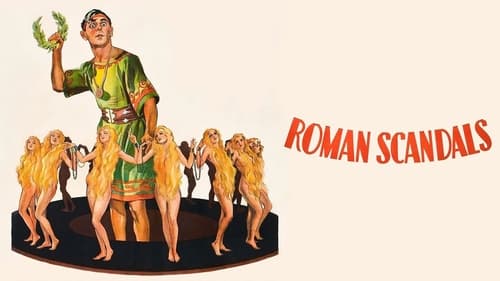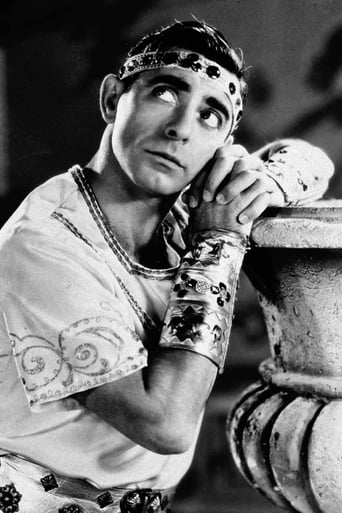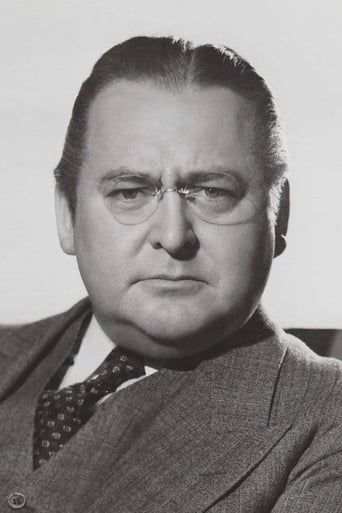Protraph
Lack of good storyline.
PiraBit
if their story seems completely bonkers, almost like a feverish work of fiction, you ain't heard nothing yet.
Jakoba
True to its essence, the characters remain on the same line and manage to entertain the viewer, each highlighting their own distinctive qualities or touches.
Gary
The movie's not perfect, but it sticks the landing of its message. It was engaging - thrilling at times - and I personally thought it was a great time.
irishm
I recently "discovered" the hilarity that is Eddie Cantor and am taking every opportunity to see him in action. This is a nice little film that seems to have it all: music, comedy (both physical and verbal), a good cast, and a cohesive storyline. The effort that the filmmakers put into some of the smaller touches, like SPQR stamped on everything from the auctioneer's amulet to the metal plate "Oedipus" uses to cover his rear end in fear that his new master will want to beat him, are particularly impressive, because one wonders how many viewers would have noticed them in the first place. (I definitely wouldn't have, except I've done a lot of walking in Rome and I've seen SPQR on hundreds of manhole covers.) The songs are catchy, particularly "Build A Little Home" which I was still humming two days later. The blackface number, a Cantor trademark, will hopefully be taken as a product of its time and not as a deliberate affront… so far, I think all his pictures except one that I've seen have had this element. Unfortunately, it does make it a little hard to share the film with others whose levels of tolerance for that kind of thing might differ. I can't say as I enjoy it, but I'm not willing to throw the baby out with the bathwater either... Cantor is a very talented comedian/song & dance man, and I enjoy the vast majority of what I've seen of his work.For fans on the lookout for a very young Lucille Ball, here's a tip: don't look for her, LISTEN for her. I'm all but 100% sure I heard her distinctive voice at least once in the beginning sequence out in the street of modern-day West Rome, and again at the end after the dream sequence. I'm sure she was also one of the glamour girls in Ancient Rome as well, but I can't figure out which one.All in all, an enjoyable movie. I'll definitely be looking for more from Cantor.
weezeralfalfa
WARNING: A blackface musical number is included. If sensitive to such, best not to view this film, or close your eyes during this portion.The 4th in a series of Eddie Cantor musicomedies produced by Sam Goldwyn from 1930-36, contains my favorite song and musical production in this series ,in "Build a Little House". Within the context of a community having been just evicted from their homes, the idea of setting up the contents of their homes on their lawns and sidewalks is rather bizarre, which adds to the attraction They are expressing their defiance against Mr. Cooper: the 'town boss', who apparently owns their former homes or the mortgages on them, and who wants to build a new jail in place of their homes. At present, Mr. Cooper is leading the dedication ceremony for a Museum of Roman Art, which consists mainly of statues of ancient Roman big wigs and gods, which he previously donated land for. Somehow, Eddie got into the museum ahead of this ceremony, and hung his clothes on various statues, while sleeping. This, along with Eddie's constant correction of his identification of the beings represented by the statues much annoys Mr. Cooper. Eddie complains that he promotes destroying the homes of law-abiding citizens in order to build houses for statues and criminals. The idea of unjust, as well as justified, evictions was especially relevant to Depression audiences. For his embarrassments of Mr. Cooper and the rest of the town big wigs, Eddie is banished from his town of West Rome. During his walk out of town, he imagines he's back in ancient Rome, where hopefully there is less political corruption than in Depression America. However, Eddie finds that corruption and exploitation of the powerless by the powerful was just as pervasive in ancient Rome as in West Rome. He, himself, is sold as a slave, fortunately , to a kind-hearted aristocrat, who sets him free. However, he witnesses the selling of naked beautiful young women(Goldwyn Girls) as slaves. He witnesses the over taxation of the populace to finance construction of new monuments and other public buildings, while the excess is used to finance the exorbitant living expenses of the emperor and his retinue. Eddie is thrown in prison with a captured princess(Sylvia), from which he escapes by having his guards, and even the emperor, inhale a laughing gas from his magic vase. The emperor comes up with a sneaky idea to get rid of Eddie. He orders him to be his new wine and food taster, knowing that the lifespan of recent food tasters has been very short. Seems the empress is determined to hasten the death of her husband by feeding him poisoned food and wine. After the royal crocodile dies from eating poisoned nightingale, the emperor orders Eddie thrown to the lions. However, Eddie escapes and takes over a chariot, with Josephus and Princess Sylvia in a chariot ahead of him, as they are chased by palace guards. As Eddie's chariot is wrecked, he awakens to find himself back on the edge of West Rome. He remembers a check he found on the street from Mr. Cooper to the police chief, for $5000. He thinks this is proof of bribery by Mr. Cooper. Apparently, it stands up in court, and the participants in the bribery are sent to jail. His friends now can move back into their homes, as Eddie reprises "Build a Little Home".I have a problem with the whole business of Mr. Cooper's corruption and Eddie's discovery of it. The nature of Mr. Cooper's corruption is unclear to me. How does he benefit from donating property he owns toward construction of a jail? Tax breaks? Construction profits? Eddie's finding of the $5000. bribery check dropped on the street is highly unlikely, and how could he prove this check was for bribery? Harry Warren and Al Dubin were borrowed from Warner to composed the new songs. It was found that they worked well with choreographer Busby Berkeley. This was Busby's last film for Goldwyn, he moving to Warner where he would again be teamed with Warren and Dubin for a series of very popular musicomedies. Then, both moved to 20th Century Fox, where they collaborated in "The Gang's All Here", with Mack Gordon in place of Al Dubin.Besides the "Build a Little Home" production, in another big production, Eddie puts on blackface and sings "Keep Young and Beautiful" In one portion, a circle of Goldwyn Girls are nude, except for wigs of extra long hair that cover their breasts and privates. This was the year before the new Motion Picture Code went into full effect, when I'm sure, this would not be allowed.
ccthemovieman-1
This was my first look at Eddie Cantor, whom I subsequently saw in a few other films. I thought he was funny, a very entertaining entertainer - a guy who could sing well and tell jokes and perform slapstick comedy. With all that, he reminded me a bit of the Marx Brothers. He could fit in with those guys, particularly Groucho with his comparable wit and short stature.Even though "Roman Scandals" was only 92 minutes, it would have been even better cut about 10, although I'm not complaining. In between the gags and the sappy Roman days story were at least three songs by Canotr, who was a decent singer and whose songs were pretty good, along with two Busby Berkely numbers with a bunch of scantily-clad ladies. It's corny stuff but it's still good. Lucille Ball is supposed to be in here but I didn't spot her in the two times I've watched this movie. I hardly recognized Gloria Stuart, too.The last part of the movie was similar to the climax of many a silent film comedy with a great chase scene. Cantor, a la Ben-Hur, raced his chariot with four white horses. Instead of an arena, however, Cantor raced through the countryside. There were great stunts and funny bits in that race.It was a great finish to a dated-but-very entertaining film. I wonder why Cantor's films are not available on DVD? I hope that oversight is corrected soon.
silverscreen888
What needs to be understood about this entertainment film is that it is a revue. The 'hook" for its use of the time-travel gimmick, forward or in this case backward, which it helped to inspire for years to come is a parallel drawn by the authors between a corrupt West Rome, Oklahoma and the governors of ancient Rome's empire. The bridge between the two is opened in the mind of Eddie, played with verve and charisma by Eddie Cantor. In this the most lavish of his four 1930s musicals, with choreography by Busby Berkeley, Cantor imagines himself back in ancient Rome, where he uncovers corruption similar to his own small town's problems. In this musical comedy enlivened by Berkeley, with story and gags by George S. Kaufman, Nat Perrin and and Robert Emmet Sherwood among others, Eddie first finds bribery going on by a developer who wants to build a new jail, dispossessing many residents in the midst of the great Depression. As a result of his protests, after singing a song, Eddie is thrown out of town by police. He then finds himself inexplicably in ancient Rome, and after insulting the Empress, he is condemned to be sold as a slave. Narrowly escaping the clutches of an amorous hag, he is bought by Josephus, handsome David Manners, who wants him as a friend, not a slave. Meanwhile, the Emperor Valerius's favorite, played by Ruth Etting, is being sold away. This leads to the magnificent "No More Love" number involving naked girls covered only by long tresses chained to huge pillars and a Berkeley dance number involving a symbolic slave-girl dancer who plunges from the top of a huge staircase at the end of the number. Meanwhile, the story continues. The four strands involved are Josephus's love for a Princess (Gloria Stuart), Eddie falling afoul of Roman mores, the Empress Agrippina, Verree Teasdale, trying to poison her philandering husband, played with award-level gusto by Edward Arnold, and Valerius pursuing Sylvia (Stuart). Josephus has renamed Eddie "Oedipus"; an hilarious sequence involves "lava gas" being administered to Eddie, then to the royal torturers and finally the Emperor. The Emperor wants Olga back, but still has time to pursue Sylvia. Josephus tries to free both Eddie and Sylvia when the Emperor takes them but is rebuffed. Sylvia agrees to be taken to the palace--to remain there until she falls in love with Valerius-- if he will leave her people unpunished. Then the imperial food taster dies--Agrippina's work, of course; and Eddie gets the job. By this time he has introduced several U.S. vices including crooked dice into ancient Rome. Agrippina summons Eddie to her couch and tells him she wants to poison Valerius. As a precaution, Valerius banishes his rival Josephus who decides to wait for Sylvia, to be spirited away to him, in his chariot. After some tribulations with the palace's majordomo, Alan Mowbray, Eddie gets the message he's been given to Sylvia. After another song in the women's quarters, Eddie finds out about corruption involving Valerius and two senators--a parallel to the West Rome chicanery. Agrippina then warns Eddie not to eat the night's dinner, which he feeds to the royal crocodile. The Empress puts the blame for the animal's demise onto Josephus and Sylvia; Josephus takes Sylvia away in his chariot, and after being condemned to be thrown to the lions himself, Eddie escapes and tries to catch them, to prevent Josephus's being killed at the port of Ostia. After a memorably and funny chariot chase, Cantor wakes up in the U.S. again; and there is a bribe to the police chief as evidence of the wrongdoing he had claimed in his pocket. The satire ends happily, but not without having raised disturbing parallels between republicans' poisoning of the federal reserve and US corruption and the statism of Rome's authoritarian emperors. The piece is a satire from beginning to end, with elements of comedy, drama, parody and song. it is a difficult sort of film to do well, I assert; and to expect this to be any one sort of offering is to fail to comprehend its purpose. This is a thinking-man's light-entertainment, nothing more and a great deal more than less. Girls in revealing costumes, an escapist look at Roman parallels, some delightful actors, a few songs and several spectacular sequences; this was entertainment in the 1930s and for those willing to enjoy it on its own terms, as pure fun, it still is. Every time-travel comedy made since "A Connecticut Yankee" of 1931 and this film owes a great deal to the inspiration of both, but especially I suggest to "Roman Scandals". Frank Tuttle directed this fast-paced and sumptuous romp. The cinematography was by Ray June and Gregg Toland, with costumes by John W. Harkrider, and difficult art direction was provided by Richard Day. Alfred Newman did the music, Harry Warren the original songs. In the cast, Arnold and Teasdale are wonderful, the young leads are attractive throughout and Alan Mowbray delightful in a comedic turns. There are several important actors in small parts including Jane Darwell, Lucille Ball and Billy Barty. With an updated score, I suggest this seminal musical could be successfully remade; but the hard part would be to remove the Eddie Cantor contribution, which was as much a pattern for future comedic talents such as Lou Costello and Jerry Lewis as it was intrinsic to the fun of the production. This Samuel Goldwyn opus may be a trifle pretentious here and there, but not one moment of it I suggest is ever dull.






